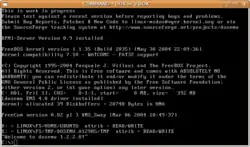 DOSEMU Running on C:\ | |
| Original author(s) | DOSEMU Team |
|---|---|
| Initial release | September 3, 1992[1] |
| Final release | 1.4.0
/ May 5, 2007 |
| Repository | |
| Operating system | Linux |
| Type | Compatibility layer |
| License | GPL |
| Website | www |
| Preview release | 2.0pre9
/ 29 January 2022 |
|---|---|
| Repository | github |
| Website | dosemu2 |
DOSEMU, stylized as dosemu, is a compatibility layer software package that enables DOS operating systems (e.g., MS-DOS, DR-DOS, FreeDOS) and application software to run atop Linux on x86-based PCs (IBM PC compatible computers).
Features
It uses a combination of hardware-assisted virtualization features and high-level emulation. It can thus achieve nearly native speed for 8086-compatible DOS operating systems and applications on x86 compatible processors, and for DOS Protected Mode Interface (DPMI) applications on x86 compatible processors as well as on x86-64 processors. DOSEMU includes an 8086 processor emulator for use with real-mode applications in x86-64 long mode.
DOSEMU is only available for x86 and x86-64 Linux systems (Linux 3.15 x86-64 systems cannot enter DPMI by default. This is fixed in 3.16).[2]
DOSEMU is an option for people who need or want to continue to use legacy DOS software; in some cases virtualisation is good enough to drive external hardware such as device programmers connected to the parallel port. According to its manual, "dosemu" is a user-level program which uses certain special features of the Linux kernel and the 80386 processor to run DOS in a DOS box. The DOS box, relying on a combination of hardware and software, has these abilities:
- Virtualize all input-output and processor control instructions
- Supports the word size and addressing modes of the iAPX86 processor family's "real mode", while still running within the full protected mode environment
- Trap all DOS and BIOS system calls and emulate such calls as needed for proper operation and good performance
- Simulate a hardware environment over which DOS programs are accustomed to having control.
- Provide DOS services through native Linux services; for example, dosemu can provide a virtual hard disk drive which is actually a Linux directory hierarchy.[3]
- API-level support for Packet driver,[4] IPX, Berkeley sockets (dosnet).[5][6]
See also
References
- ↑ "DOSEMU for Linux / History / Browse Commits".
- ↑ "#751632 dosemu: DPMI fails to initialize on x86_64 with linux 3.15". 140715 bugs.debian.org
- ↑ "The dosemu HOWTO". Archived from the original on 2012-12-25. 090430 dosemu.sourceforge.net
- ↑ "dosemu v1.3.5 source". 090430 prdownloads.sourceforge.net src/dosext/net/net/pktnew.c
- ↑ "dosemu v1.4.0 source". 2007-05-05. Retrieved 2016-04-06. src/dosext/net/net/ipx.c src/dosext/net/v-net/dosnet.c
- ↑ "The DOSEMU team is proud to announce DOSEMU 1.4.0". 2007-05-05. Archived from the original on March 15, 2016. Retrieved 2016-04-06.
NetWare and other network connectivity via built-in IPX and pktdrvr support /../ the dosemu-freedos binary package starts a DOS-"C:\>"-Drive 'out-of-the-box' in a normal user's $HOME directory and runs without any further configuration (no root rights needed)
{{cite web}}: CS1 maint: unfit URL (link)